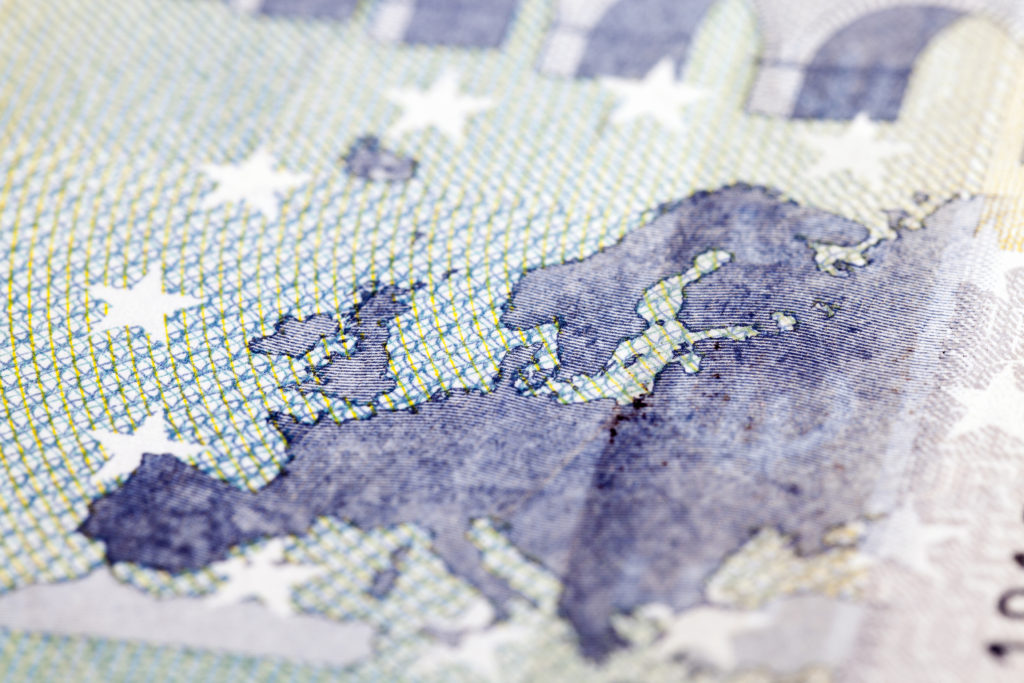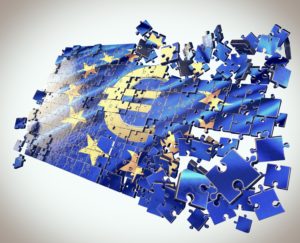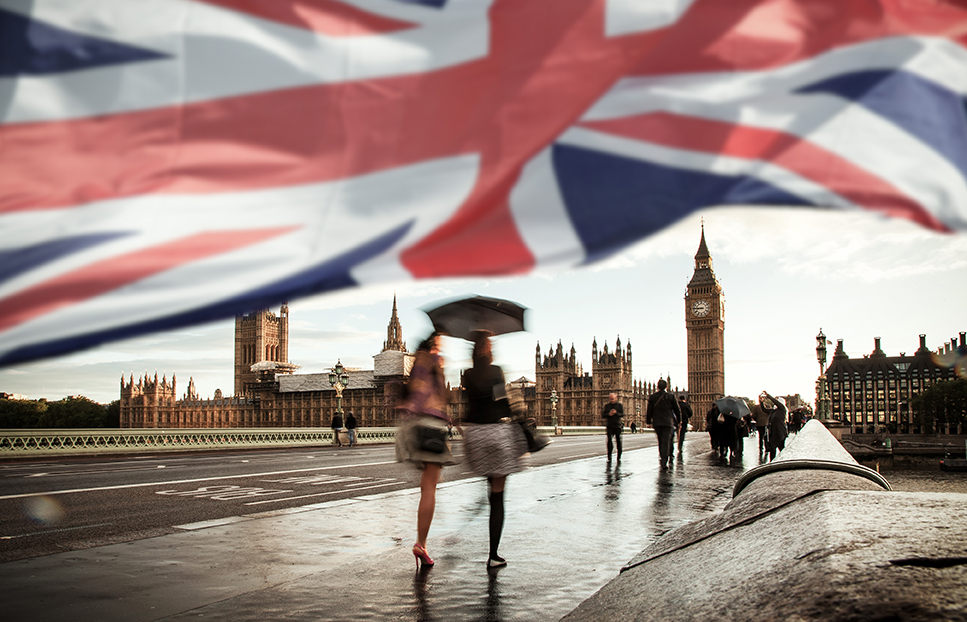
Jon Hutman – Designs on Movies: From ‘The Tourist’ to ‘The Mummy’
August 22, 2017
It Takes Two to Tango: Movie Surveys 50-Year Love Affair
September 23, 2017There will always be an England, but will there always be a Brexit? Economist Steve McCarthy takes a personal look at the issues.
(A sneak peek of an article planned for our next DANTE in print.)
We all live by the stories we tell ourselves. They lie at the heart of our identity and form our opinions. They modify and change slowly over time as we become subject to new influences and have new experiences – but they will hardly ever be directly changed by debate – however rational and polite that debate may be.
So it is with peoples and nations and with the European Union. Monnet, Schumann and others, the great visionary founders of the EU – or the Coal and Steel Community as it was in its first incarnation – had a story to tell. Over many centuries the peoples of Europe had been constantly at war with each other, most recently in World War II. They now wished to found an institution, to start a process, which would bind the European nations so closely together as to make warfare impossible in the future. This vision of “no more war in Europe” sustained the EU and carried it forward for at least a generation.
All along, of course, the peoples of the member states have had their own narratives and stories. For many, the past hegemony of Germany is an important element. Inevitably these narratives were somewhat in conflict with the vision of the founders of the EU. But, so long as the leading European politicians had personal memories of the war, that vision remained dominant. However, in due course as a new generation of political leaders, with no personal memories of the horrors of war, came to power so did the national stories begin to come to the fore again. So, even though its original purpose was as relevant as ever, the EU needed a new vision to sustain it against these trends. For a while the reunification of the western and eastern parts of Europe as a family of democratic nations served this purpose – even if the new members’ commitment to democratic values has not always been very deep. Then came the vision of a common currency. But the Euro was brought into being over-hastily without an adequate financial and fiscal structure being set in place to support it.
The debt crisis exposed these weaknesses in the Euro’s structure. Then the manner in which the crisis was addressed served to reinforce the more nationalistic narratives lurking under the surface. This applied particularly in relation to Germany. Ever since 1945, Germany had been careful not to present a hegemonic image to its partner countries, particularly militarily and diplomatically. But part of Germany’s own story is a predilection for sound money, a mercantilist approach to trade together with a gut fear of hyper-inflation and of over-indebtedness. So the debtor countries within the Eurozone – most especially Greece – were squeezed with deflationary austerity. Certainly successive Greek governments brought nemesis on themselves by the hubris of wild, unfunded spending and Greece should never have been permitted to join the Eurozone in the first place. Still, its debt problems had to be addressed but doing so by such a severe bout of deflation was simply incompetent in economic terms – as the Greek economist and sometime Minister of Finance, Yanis Varoufakis, correctly pointed out – as also did the IMF. But Germany’s own history makes it scarcely able to acknowledge that its own persistent current account surpluses were, largely, the counterpart of the deficits of the other Eurozone countries. Germany whose infrastructure is ageing and increasingly poor should have pursued expansionary economic policies alongside the deflationary ones imposed on other countries. More recently it has found itself in conflict with other EU member countries, some of which have histories of Ottoman domination, over the influx of refugees and migrants from Syria and Iraq. So in different ways the spectre of German hegemony has re-appeared. In the past Britain and France offered an effective counterweight to this tendency. But now Britain has decided to leave and France has in recent years been weak, both politically and economically, though perhaps under President Macron it will recover its traditional role. We will come back to these considerations later.

In short, the challenge of finding a new story to bind the European nations together continues. One possibility, particularly since the EU is viewed by many people as an elitist project, would be to introduce a uniform EU-wide ‘unconditional basic income’. Even at a modest level of a few hundred euros a month, this could greatly enhance a sense of Europe-wide solidarity. But to pursue this topic would be to stray from our main theme.
Against this background, the narrative of the British people, the English in particular since the Scots and Irish narratives are rather different, contrasts with and is utterly different from those of other European nations. Until three generations ago, the people of this small island ruled a quarter of the entire world. Their navy controlled the oceans and high seas. They supposedly brought values of democracy, of ‘fair play’ and free speech to the countries they ruled and beyond. They beat, albeit not alone, the forces of Nazism and fascism in World War II. In earlier times, they had been pre-eminent in the abolition of medieval and feudal land tenure, in promoting ‘clubs’ and civil society, in leading the industrial revolution, in organising modern manufacturing through large enterprises, in promoting novel techniques of finance, and not least in promoting free trade across the world.
All of this story is fundamentally true, if not quite as straightforward and benevolent as we might like to believe. And it is constantly reinforced by the stories and myths of popular culture, not least those of the Second World War. They depict a world of Dunkirk on the one hand and of Downton Abbey and Trollope’s Barchester Chronicles on the other. It is a world where English village and small-town life, at least in the so-called Home Counties, continues as it has seemingly always done, largely untouched by the disturbances and wars in far-away foreign lands, including the many that Britain was itself waging. It is the mannered world of Jane Austen’s landed gentry – even if they were sometimes living off the proceeds of slave plantations in Jamaica. At its heart was the established Anglican Church, gathering people together every Sunday, with no Muslim preacher anywhere in sight.
There is however a second narrative that runs counter to the first, but also melds with it as shown in the opening ceremony of the 2012 London Olympics. It describes a world of northern industrial enterprise, of exhausted and exploited workers, of poverty and workhouses. It is epitomized in Elisabeth Gaskell’s North and South, in the works of Charles Dickens and, more prosaically, in Conditions of the Working Class in England by Friedrich Engels. This story goes on to proclaim the success of the Labour Party and the Trade Unions in bringing better, stable working conditions to working people. It is a world where a unionized labour force resists the capitalist bosses and enjoys steady, adequately paid, employment for the duration of their working lives. This narrative reaches its climax, with the post war Attlee Labour government which introduced the National Health Service, which many believe, still now, to be the best in the world. It established the welfare state including, not least, pensions for all and unemployment benefit for those who fall out of work.
Surely no other country could match such a peerless history. Surely there’s nothing for the British to learn from foreigners, certainly not from its squabbling European neighbours.
But it’s over, finished, and has been for quite a while.

There will always be an England..
Neither narrative is any longer fit for purpose. The Brexiteers, both the voters and the politicians egging them on, have failed to understand this. Theresa May hankers for the peaceful Oxfordshire country rectories and villages of her youth with fields of golden wheat to run through, for a time when Britain ‘punched above its weight’ both diplomatically and militarily and had a role to play in international forums and world affairs – rather than being politely ignored. On the other side, Jeremy Corbyn, a closet Brexiteer, and his most ardent supporters dream of the time, not quite so long ago before the advent of Margaret Thatcher, when British manufacturing industry was still world-class – indeed still existed – and when vital infrastructure was owned by the state in the interests of the whole nation, rather than by foreigners only interested in maximizing profits and minimizing wages. Sadly, he seems ignorant of the consistent role the EU has played in combating monopolies and in protecting the status and rights of ordinary workers – in general against the steady opposition of recent British governments in the grip of neo-liberal ideas. But at least his heart is in the right place!
In one epic episode of the 1980s satirical TV series, Yes, Prime Minister, that wily civil servant, Sir Humphrey, comments that the existence of the EU, or Common Market as it would then have been called, represented the ultimate failure of British foreign policy. For the previous two hundred years that policy had been to keep the countries of continental Europe fighting each other. Now they had stopped doing so. Eventually the British government noticed this – even if not so explicitly as in the TV series – and came to realise that Britain had no choice but also to join this European project, which it did in 1973. However, neither Britain nor the British people ever ‘got it’. They never came to comprehend the different narratives of their EU partners or the narrative of the EU as a whole. For British politicians, less so the civil servants perhaps, the EU was essentially an economic project, and a zero-sum game at that. It was a game in which stalwart British politicians would go periodically to Brussels to fight for ‘British’ interests against the others and then be able to stand up in front of a podium at the end of the day and brag about the battles won.
Then along comes an incompetent Prime Minister who foolishly calls a referendum on Britain’s continued membership of the EU in order to heal a rift within his own political party. The campaigning was characterized by lies and political posturing on both sides of the argument, though more so by those who campaigned to leave. Voters did not, could not, understand the complexity of the question being posed, but with stagnating living standards, unaffordable housing and so on, they were happy to be given the opportunity to kick out at the governing political establishment. The referendum had no legally binding force but the Members of Parliament collectively evaded their responsibility to be representatives of their electors rather than their megaphones. So now the British government, supposedly negotiating withdrawal, finds itself faced with a web of thousands of commonly agreed European regulations, standards and institutions which will in practice be extremely difficult to disentangle. Indeed it could be said that the vision of the founders of the EU has come to wonderful reality; it has become extremely difficult for a European nation to break away from the Union.

Green and pleasant land
Against this, the Brexiteers are promoting a vision of a world governed by Free Trade. But this is a myth – though you might not expect someone who has been trained as a medical doctor to know that. There is no free trade anymore – if ever there was. Trade has always depended on some, often implicit, rules – on weights and measure for example – on trust between buyer and seller and ultimately on the possibility of some sanction against those who cheated. In recent decades, as tariffs across the world have largely been negotiated away to minimal levels, it is the non-tariff barriers that govern trading relationships – the common standards, often related to health and safety issues, the compatibility of, say, different engineering standards, the rules and institutions for dispute resolution and so on. Nowadays, so-called ‘free trade’ agreements are actually negotiated agreements on such standards and non-tariff barriers – in effect free trade has become managed trade.
So the story of Brexit is essentially that of seemingly irreconcilable narratives, between Britain on the one side and its European partners on the other. What is to be done? First, we need to remember that these narratives, even if deep-rooted are not immutable. They can be fed or they can be starved. They can and do slowly mutate over time. For example, in Britain and probably across Europe as a whole, young people are much more likely than their elders to believe a story of a common European identity which permits them to move, and work, unhindered across the whole European space. And, if the British economy heads into recession, as it is very likely to do in 2018 and 2019 in contrast with accelerating growth in the Eurozone, even those wedded to a belief in Britain’s great and unique history may come to value the prosperity which the European project has brought.
‘Taking back control’ will increasingly be seen to be the myth it really is. For people in, say, the North East of England, Westminster is almost as remote as Brussels. It is indeed fascinating that the June 2017 election in Britain was waged on the issue of Brexit by the Tories, who wished to be given a strong negotiating mandate, but by the Labour Party on the issue of the ongoing and unnecessary austerity that the Tory government has laid on the British people – or rather on those people who are poor, weak or vulnerable, who have seen their wages and living standards fall, while the rich and powerful continue to cream off the surpluses of the economy. The Tories won in numbers, but the real victory went to the resurgent Labour Party. People were already beginning to move on from the Brexit debate.
 In such a way do the dominant narratives change and mutate. Nothing is predictable in politics – especially across the world over the last two years. For the British people, Brexit will grow less important as something else – perhaps rage against inequality – will take its place. In consequence the best way out of the Brexit storm into which the British people and government have sailed would be as follows. The 27 EU Member States should refuse any ‘transition’ arrangements with Britain, but rather unilaterally and spontaneously extend the two year Article 50 negotiating period to five years.
In such a way do the dominant narratives change and mutate. Nothing is predictable in politics – especially across the world over the last two years. For the British people, Brexit will grow less important as something else – perhaps rage against inequality – will take its place. In consequence the best way out of the Brexit storm into which the British people and government have sailed would be as follows. The 27 EU Member States should refuse any ‘transition’ arrangements with Britain, but rather unilaterally and spontaneously extend the two year Article 50 negotiating period to five years.
Why would it be in their interests to do this? Most people in the ‘27’ countries probably see the British referendum result as incomprehensible and foolish – like a temporary fit of adolescent pique, to which the best solution would be to wait for things to cool down and for the British people to come back to their senses. And, notwithstanding the increasingly bad-tempered negotiations, it seems unlikely that any of the ‘27’ really want Britain to leave the EU. It makes a net contribution to the budget after all! Moreover, the different perspective that Britain used to bring to EU discussions, emerging from its different history, was genuinely appreciated by other member states, such as the Netherlands, even if it was also a source of irritation! Most importantly Britain, along with France in particular, offered an effective counterweight to the risk of German dominance within the EU. No European country, including Germany, wants a return to German hegemony, whether real or illusory. Indeed the approach advocated here, putting off the final decision until it is absolutely necessary, or until the problem simply goes away, would appeal to the decision-making style of Angela Merkel – who seems likely to remain as German Chancellor after the forthcoming German election. Apparently the German language even has a new verb for it: merkeln. The best way to deal with Brexit is to merkeln the decision!
In making a spontaneous offer to extend the negotiating period to five years, the ‘27’ would not need to spell out all these considerations. They could, if they wish, simply use the argument that two years is manifestly too short a period for such a complex negotiation, especially given Britain’s minority government at the present time. Such a move would certainly and greatly discomfit the current British government which is dominated by those advocating a ‘hard’ Brexit. But at the same time it would be unable to get the House of Commons, where sovereignty really lies, to vote to leave the EU after two years without a fully negotiated agreement, if a further three years was offered and available. Then we can simply wait for the storm to abate. In the remaining three years, as recession bites deeper and deeper into the British economy, as political priorities and perhaps governing parties change, and maybe as the EU itself discovers a new purpose, the whole Brexit debacle will fade into the background. Of course it may never go away; those on the far right of the Tory party, relatively few in number, will rage on about betraying the will of the British people. But they have nowhere else to go. Maybe a second referendum will be needed eventually to bury the project completely. Or perhaps the British Members of Parliament, as representatives of the people, but not their echo chambers, will finally face up to their responsibility to vote with wisdom and prudence.
Stephen McCarthy is a physicist by training, moving to economics and from there to development finance. He has worked for the European Investment Bank (EIB) and the government of Botswana.
(DANTE magazine encourages debate over a wide range of topics and publishes polemics from all sides to stimulate discussion. While publication does not imply endorsement, we give space only to articles well-written, well-researched and well argued.)




